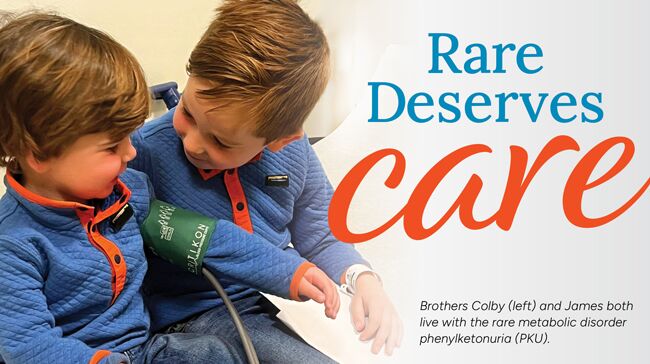Washington, D.C., August 28, 2017—As part of its ongoing series to promote awareness and education regarding rare diseases, the National Organization for Rare Disorders (NORD) has published a report on Sitosterolemia. This new resource is available free online to individuals around the world.
As the primary advocacy organization in the U.S. for people who have rare diseases, NORD provides educational resources for patients, caregivers and medical professionals. Disease-specific reports are developed in collaboration with NORD’s patient member organizations and independent medical experts. The reports can be accessed through NORD’s Rare Disease Database at rarediseases.org.
“People who have rare diseases often have difficulty finding accurate and easy to understand information about their condition,” said Marsha Lanes, MS, CGC, a genetic counselor and medical editor in NORD’s Educational Initiatives Department. “The purpose of NORD’s free Rare Disease Database reports is to provide information and resources to help those who may be dealing with little-known and misunderstood medical conditions.”
The report on Sitosterolemia was developed in collaboration with Semone Myrie, PhD, Department of Human Nutritional Sciences, University of Manitoba; Jean-Baptiste Roullet, PhD, Clinical Professor, Department of Pharmacotherapy, College of Pharmacy, Washington State University; and the Sitosterolemia Foundation.
“The Sitosterolemia Foundation and its Scientific Advisory Board appreciate the opportunity to contribute to this report. It is our hope that, with increased awareness of this condition, more patients will receive the proper diagnosis and, therefore, the proper treatment.” Cyndi Jones of the Sitosterolemia Foundation said, “[We] commend the efforts of NORD to spread awareness and provide accurate information on this and other rare conditions.”
Sitosterolemia is an autosomal recessive genetic condition caused by mutations in the ABCG5 or ABCG8 gene that causes the body to store plant sterols. Most people normally absorb plant sterols from the food they eat and excrete them in the gut. People with sitosterolemia absorb plant sterols but cannot excrete them, resulting in accumulation of plant sterols in the body that can lead to high cholesterol, fatty deposits under the skin called xanthomas, and sometimes joint stiffness and pain.
NORD has published more than 1,200 disease-specific reports in its Rare Disease Database. The patient advocates who established NORD considered it a top priority to provide information about rare diseases for patients and their families. As a result, they began to develop the Rare Disease Database shortly after NORD was established in 1983. In the 1990s, when NORD launched a website, the database became available online. The reports are accessed by millions of visitors around the world each year.
“Our goal is to provide resources for every person with a rare disease, whether you are recently diagnosed or further along in your patient journey. We are thankful to the Sitosterolemia Foundation and Dr.’s Myrie and Roullet for their help in developing this report.” added Lanes.
###
About the National Organization for Rare Disorders (NORD)®
The National Organization for Rare Disorders (NORD)® is the leading independent advocacy organization representing all patients and families affected by rare diseases. NORD is committed to the identification, treatment and cure of the 7,000 rare diseases that affect 30 million Americans, or 1 in every 10 people. NORD began as a small group of patient advocates that formed a coalition to unify and mobilize support to pass the Orphan Drug Act of 1983. For more than 30 years, NORD has led the way in voicing the needs of the rare disease community, driving supportive policies and education, advancing medical research, and providing patient and family services for those who need them most. NORD represents more than 260 disease-specific member organizations and their communities and collaborates with many other organizations in specific causes of importance to the rare disease patient community.
Media Contact:
Lisa Phelps
(203) 702-2872
[email protected]



